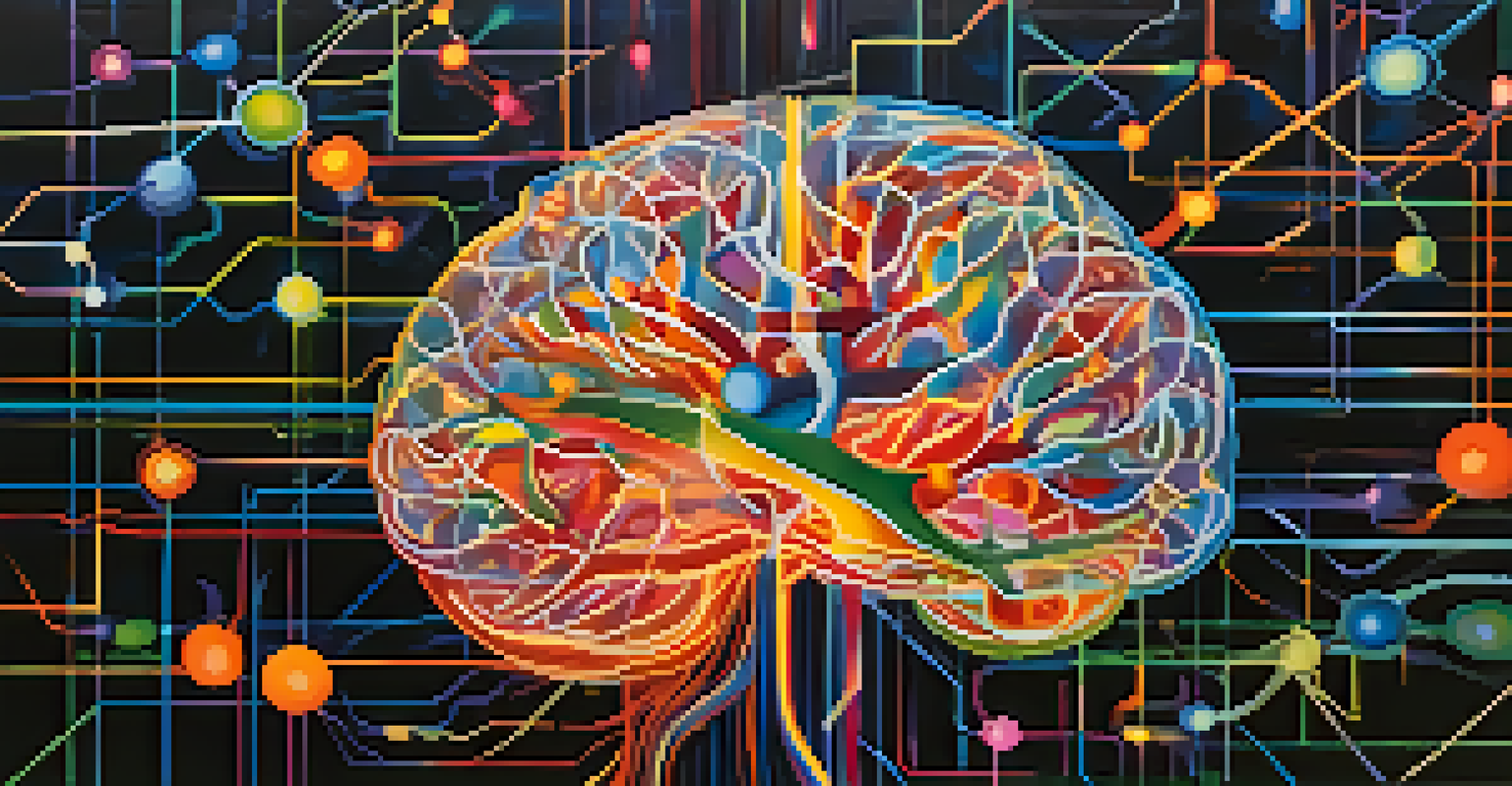Using Hallucinogens to Address Trauma-Related Disorders

Understanding Trauma-Related Disorders and Their Impact
Trauma-related disorders, such as PTSD, can significantly disrupt a person's life. Individuals may experience flashbacks, anxiety, and emotional numbness, often leading to a cycle of suffering. Understanding these disorders is crucial for recognizing the need for effective treatment options.
The greatest weapon against stress is our ability to choose one thought over another.
Traditional therapies, including cognitive-behavioral therapy, have helped many but aren't always effective for everyone. Patients may seek alternative methods, prompting interest in the potential of hallucinogens. By exploring these options, we can open doors to new healing pathways.
The conversation around mental health is evolving, and with it comes the need for innovative approaches. Hallucinogens, such as psilocybin and MDMA, have shown promise in recent studies. This opens the door to a deeper exploration of their potential therapeutic benefits.
How Hallucinogens Work in the Brain
Hallucinogens affect the brain's serotonin receptors, which play a role in mood regulation. By altering brain chemistry, these substances can create profound emotional experiences. This shift may allow individuals to process trauma in a new light, offering insights that traditional therapies might not.

During a hallucinogenic experience, users often report a sense of connection to themselves and their surroundings. This feeling of unity can lead to breakthroughs in understanding and confronting past traumas. It's as if the mind, usually closed off from painful memories, is given a temporary key to unlock deeper feelings.
Hallucinogens Show Promise in Healing
Recent studies indicate that hallucinogens like MDMA and psilocybin may effectively treat trauma-related disorders such as PTSD.
Research suggests that these substances can foster neuroplasticity—the brain's ability to reorganize itself by forming new connections. This means that after a hallucinogenic experience, individuals may be better equipped to integrate their traumatic experiences into their life narratives. It's a fascinating area of study that warrants further exploration.
Research Findings on Hallucinogens and Trauma Treatment
Recent studies have shown promising results for hallucinogens in treating PTSD and other trauma-related disorders. For example, a study on MDMA-assisted therapy revealed significant reductions in PTSD symptoms among participants. Such findings indicate that these substances could serve as powerful adjuncts to traditional therapeutic methods.
The mind is everything. What you think you become.
Psilocybin research has also demonstrated potential benefits, with participants reporting enhanced emotional processing and reduced anxiety surrounding traumatic memories. These results encourage a reevaluation of how we approach trauma treatment. The positive outcomes inspire hope for those who have struggled with conventional therapies.
While results are encouraging, it's essential to approach this research with caution. More extensive studies are needed to understand the long-term effects and safety of hallucinogen use. Continued research will help determine the best practices for integrating these substances into therapeutic settings.
The Role of Therapy in Hallucinogen-Assisted Treatment
Hallucinogens are not a magic bullet; they're often most effective when combined with therapy. Trained therapists guide patients through the experience, providing support and helping them process emotions that arise. This therapeutic alliance enhances the potential for healing.
The process typically involves preparation, the hallucinogenic experience itself, and integration sessions afterward. Preparation helps set intentions and build trust with the therapist. Integration is crucial, as it allows individuals to make sense of their experiences and apply insights to their daily lives.
Therapy Enhances Hallucinogen Effects
Combining hallucinogens with structured therapy can create a supportive environment that maximizes healing potential.
This collaborative approach ensures that individuals are not navigating their experiences alone. It emphasizes the importance of safety and support throughout the treatment process. By combining hallucinogens with structured therapy, we can create a more comprehensive healing experience.
Safety and Ethical Considerations in Using Hallucinogens
As interest in hallucinogens grows, so do concerns about safety and ethical use. It's vital to ensure that these substances are administered in controlled, clinical settings. This minimizes risks and maximizes therapeutic benefits, promoting a safer experience for participants.
Screening for mental health conditions and substance use history is crucial before treatment. Certain individuals may be at risk for adverse reactions, making thorough assessments necessary. Ethical considerations also include informed consent, ensuring participants fully understand the process and potential risks.
As we advance in this field, establishing guidelines for ethical practices will be paramount. This includes ongoing education for therapists and a commitment to prioritizing patient welfare. A responsible approach can foster trust and encourage the broader acceptance of hallucinogen-assisted therapies.
Personal Stories: Successes and Challenges
Hearing personal stories from those who've undergone hallucinogen-assisted therapy can be powerful. Many individuals share transformative experiences, describing how these substances helped them confront and process deep-seated trauma. These narratives highlight the potential for healing that lies within these unconventional treatments.
However, it's important to recognize that not everyone has the same experience. Some individuals may encounter challenges during their sessions, such as overwhelming emotions or anxiety. These stories remind us that while hallucinogens can be beneficial, they are not a one-size-fits-all solution.
Ethical Use is Crucial for Safety
Ensuring hallucinogens are used ethically and in controlled settings is vital for minimizing risks and promoting patient welfare.
By sharing both successes and challenges, we can promote a balanced understanding of hallucinogen use in trauma treatment. This dialogue helps to destigmatize the practice while acknowledging the complexities involved. Ultimately, personal stories enrich our understanding and pave the way for a more compassionate approach.
Looking Ahead: The Future of Hallucinogens in Mental Health
The future of hallucinogens in mental health treatment is promising, but it requires continued research and open-mindedness. As more studies emerge, we may see a shift in how mental health professionals view these substances. This could lead to broader acceptance and integration into mainstream therapeutic practices.
Advocacy for policy changes is also crucial, as legal restrictions can hinder research and access to these treatments. By challenging outdated perceptions, we can create a more supportive environment for individuals seeking alternative healing methods. The conversation is evolving, and it's an exciting time to witness these changes.

Ultimately, the goal is to provide individuals with the most effective tools for healing. Hallucinogens may play a significant role in this journey, offering new hope to those who have faced the burden of trauma. As we look ahead, collaboration between researchers, therapists, and advocates will be essential for realizing the full potential of these treatments.